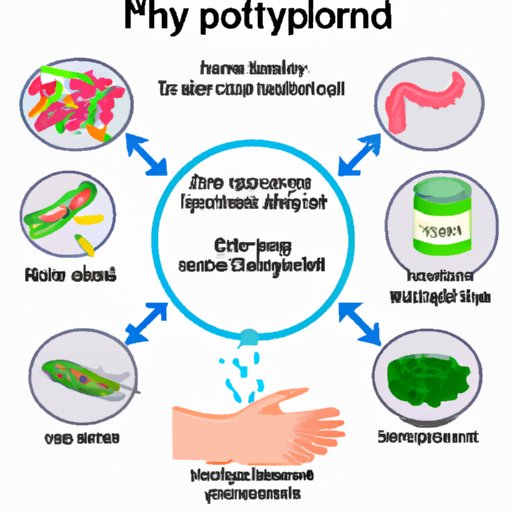
Introduction
If you’ve recently been diagnosed with H. pylori, you may be wondering what to expect after treatment. H. pylori is a bacterium that can cause a variety of symptoms, including stomach pain, nausea, and ulcers. While it may be intimidating, treatment is often a straightforward process that can help alleviate these symptoms. In this article, we’ll discuss what you can expect as you recover from H. pylori treatment and how you can manage any side effects that may arise.
Life After H. pylori Treatment: A Comprehensive Guide to Recovery
After completing your H. pylori treatment, you may experience some side effects as your body adjusts. This is normal, and most side effects will subside within a few days or weeks. Some common side effects include:
- Nausea
- Vomiting
- Diarrhea
- Abdominal pain
- Headaches
- Loss of appetite
To manage these side effects, you should drink plenty of fluids and avoid foods that may irritate your stomach. Your doctor may also recommend over-the-counter medications to alleviate any discomfort. Be sure to follow your doctor’s instructions for taking these medications, as well as any prescription antibiotics you were given during treatment.
It’s important to note that while many people feel better shortly after completing treatment, it may take some time for your body to fully heal. It’s important to be patient with yourself as you recover and to continue to take steps to support your overall health.
During this time, it’s also important to follow up with your doctor to ensure that the treatment was successful. Your doctor may request additional tests to confirm that the bacteria has been eradicated.
From Diagnosis to Recovery: What to Expect After H. pylori Treatment
Before discussing what to expect after treatment, let’s briefly review the process of diagnosing and treating H. pylori. In most cases, a doctor will diagnose H. pylori through a breath test, blood test, or stool test. If you test positive for H. pylori, your doctor will likely prescribe a combination of antibiotics and acid reducers to help eliminate the bacteria.
During the treatment process, you may experience some side effects, as we’ve discussed. However, by following your doctor’s instructions and taking your medication as directed, you can help ensure that the treatment is successful.
After completing treatment, your doctor may request follow-up testing to confirm that the H. pylori has been eradicated. This is an important step to ensure that the infection does not return and that you can continue on your path to recovery.
The Aftermath of H. pylori Treatment: What You Should Know
H. pylori is a common bacterium that many people will encounter at some point in their lives. While treatment is often successful, it’s important to be aware of the potential long-term effects of the infection. These can include:
- Peptic ulcers
- Gastritis
- Gastric cancer
However, it’s important to note that the risk of developing these complications is significantly reduced following successful treatment. By maintaining healthy habits and following up with your doctor, you can lower your risk of experiencing any long-term effects.
Managing Your Health Post H. pylori Treatment: A Step-by-Step Guide
The road to recovery after H. pylori treatment can be a long journey. However, there are steps you can take to make the process smoother and support your body’s natural healing process.
The first step is to maintain healthy eating habits. This means avoiding foods that may irritate your stomach, such as spicy foods, caffeine, and alcohol. Instead, focus on incorporating plenty of fruits, vegetables, whole grains, and lean protein into your diet.
It’s also important to stay hydrated by drinking plenty of water, herbal tea, and other non-caffeinated beverages.
Healthy Habits to Adopt After H. pylori Treatment for Long-Term Wellness
Along with healthy eating habits, there are additional lifestyle changes you can make to promote long-term wellness after H. pylori treatment. These include:
- Regular exercise
- Stress management techniques, such as meditation or yoga
- Adequate sleep
- Avoiding smoking and secondhand smoke
By adopting these habits, you can boost your overall health and lower your risk of developing any long-term complications.
Navigating Life After H. pylori Treatment: Tips and Strategies for a Strong Recovery
Recovering from H. pylori treatment can feel overwhelming at times. However, there are tips and strategies you can use to support yourself during this time. These include:
- Taking time for self-care activities, such as taking a warm bath or reading a book
- Building a support network of friends, family, or a therapist
- Staying informed about your condition by reading reputable sources
- Attend support groups for additional help
Remember that recovery is a process, and that it’s okay to take things one day at a time. By supporting yourself in these ways, you can build a strong foundation for your post-treatment life.
What Comes After H. pylori Treatment: A Journey to Healing and Health
The journey to healing after H. pylori treatment can be challenging at times. However, it’s important to remember that successful treatment can bring many positive outcomes. These include:
- Relief from painful symptoms
- Lowered risk of developing long-term complications
- Improved overall health and wellness
By following up with your doctor, maintaining healthy habits, and seeking out support when necessary, you can ensure that you continue on your journey to healing and health.
Conclusion
Recovering from H. pylori treatment can be a challenge, but it’s important to remember that you’re not alone. By following your doctor’s instructions, adopting healthy habits, and seeking out support when necessary, you can support your body’s natural healing process and ensure that you achieve a strong recovery.
Remember to be patient with yourself and to take things one day at a time. By doing so, you’ll be well on your way to a happy, healthy, post-treatment life.




